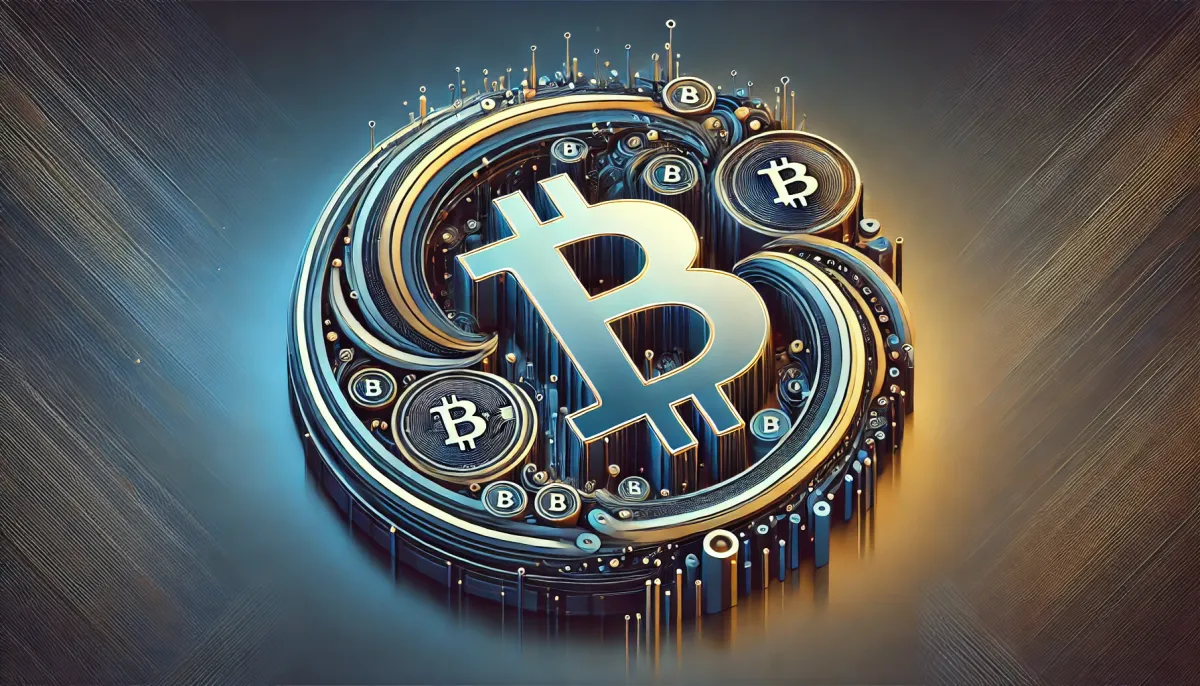Navigating the Debt Doom Loop: Bitcoin's Role Amid Financial Instability
The October 2, 2024 episode of Coin Stories had Natalie Brunell hosting James Lavish and Larry Lepard, who delved into the looming financial instability in the global economy, particularly in the United States, and its implications for Bitcoin.

Briefing Notes
My 'briefing notes' summarize the content of podcast episodes; they do not reflect my own views. If you have comments about this briefing note, please leave a comment below (requires signing up for a free blog subscription). Note that some of the podcast episodes I summarize may be sponsored: don't trust, verify, if the information you are looking for is to be used for decision-making.
Summary
In this October 2, 2024 episode of the Coin Stories podcast, James Lavish and Larry Lepard warn of an imminent financial "train wreck" stemming from debt accumulation, inflation misrepresentation, and the relentless expansion of money supply by governments, particularly the U.S. and China. As these economic challenges grow, Bitcoin is positioned as a critical hedge against inflation and currency debasement, with technical indicators suggesting a potential price breakout. This episode offers crucial insights into the global financial landscape and Bitcoin’s emerging role as a safe-haven asset.
Take-Home Messages
- Bitcoin as Inflation Hedge: Bitcoin presents a compelling opportunity for investors seeking protection from rising inflation and fiat currency debasement.
- Debt Doom Loop Crisis: The continued accumulation of government debt and reliance on money printing threatens to destabilize global economies, leading to potential financial collapse.
- Inflation Reality Check: Official inflation data is inaccurate, and real-world costs are significantly higher, underscoring the urgency for individuals to seek alternative investment strategies.
- Geopolitical Instability: Heightened geopolitical tensions, especially between the U.S. and China, increase market risks, driving demand for safe-haven assets like Bitcoin.
- Bitcoin’s Bullish Outlook: Bitcoin’s price may see significant upward movement, with technical analysis pointing to a potential breakout past the $70,000 mark.
Overview
In this episode, James Lavish and Larry Lepard provide a sobering analysis of the current global economic situation, warning that a financial "train wreck" is fast approaching. They argue that governments, especially the U.S. and China, are trapped in a vicious cycle of debt accumulation and money printing—a phenomenon they refer to as the "debt doom loop." This cycle is deemed unsustainable but necessary to keep economies from collapsing, and both experts believe it will lead to the continued devaluation of fiat currencies, including the U.S. dollar.
The conversation also highlights the misrepresentation of inflation by the Federal Reserve, which reports much lower inflation rates than what individuals are actually experiencing in their daily lives. Lavish and Lepard cite rising costs for essentials such as insurance as examples of this inflationary pressure. They argue that inflation will continue to rise, further eroding the purchasing power of fiat currencies.
Against this backdrop, Lavish and Lepard position Bitcoin and gold as the best hedges against inflation and currency devaluation. Bitcoin, in particular, is seen as having greater long-term potential due to its fixed supply and growing institutional adoption. The discussion includes a technical analysis of Bitcoin’s price movements, with both experts pointing to a "bull flag" pattern that suggests Bitcoin could reach six figures by the end of the year.
Stakeholder Perspectives
- Investors: As inflation continues to erode the value of fiat currencies, investors are increasingly turning to assets like Bitcoin and gold to protect their wealth. Bitcoin’s potential for significant price appreciation makes it an attractive option.
- Policymakers: The Federal Reserve and other central banks face mounting pressure to balance inflation control with the need to prevent economic recession. However, continued reliance on debt and money printing is undermining long-term economic stability.
- Businesses: Rising inflation and economic uncertainty pose risks to businesses, especially those reliant on stable commodity prices. Hedging strategies, including investment in Bitcoin, may become more attractive.
- Consumers: As everyday costs continue to rise, consumers are feeling the effects of inflation more acutely than official figures suggest. Bitcoin’s accessibility and potential for value preservation offer a means to safeguard purchasing power.
Implications
The growing misalignment between official inflation figures and real-world experiences threatens to further erode trust in government-reported economic data. This could lead to broader adoption of decentralized currencies like Bitcoin, which provide an alternative means of preserving wealth. The continued reliance on debt and monetary stimulus is unsustainable, and as global debt levels rise, the risk of a financial collapse increases. Policymakers will need to carefully navigate this precarious situation to avoid triggering further economic instability.
For investors, the implications are clear: traditional assets like fiat currencies are becoming increasingly vulnerable to inflation and currency debasement. Bitcoin, with its fixed supply and decentralized nature, offers a compelling alternative. As geopolitical tensions rise, particularly between the U.S. and China, Bitcoin’s role as a neutral, decentralized asset will likely become more prominent, providing protection against currency and market volatility.
Future Outlook
Lavish and Lepard's analysis points to a future where global economies remain under pressure from rising debt and inflation. The Federal Reserve’s decision to lower interest rates is a temporary solution that may lead to long-term inflationary pressures. Over the next 18 months, as geopolitical tensions and economic instability continue to grow, Bitcoin is expected to play an increasingly central role in global finance. The technical analysis discussed in the podcast suggests that Bitcoin could break out past the $70,000 mark, with potential upside beyond $100,000.
Looking further ahead, the possibility of hyperinflation, while not an immediate risk, cannot be dismissed. If governments continue to expand the money supply without addressing underlying fiscal issues, the world may face a significant currency crisis. In such a scenario, Bitcoin’s fixed supply and decentralized nature could make it one of the most valuable assets for preserving wealth.
Information Gaps
- How will the continued misrepresentation of inflation rates affect investor confidence in government-reported economic data? Misreporting inflation erodes trust in government data, making it harder for investors to make informed decisions. This could drive increased interest in decentralized, transparent financial alternatives like Bitcoin, but further research is needed to assess the long-term impact on institutional investor behavior.
- What are the potential economic consequences if the U.S. fails to mitigate the debt doom loop in the next 5-10 years? The U.S. faces severe economic consequences if it fails to address its rising debt levels, including potential financial collapse. Research into potential policy interventions and their feasibility would help clarify the risks and opportunities for mitigating this threat.
- How could external market shocks disrupt the bullish trajectory predicted by the Bitcoin bull flag? While technical analysis suggests a bullish trend for Bitcoin, external shocks such as regulatory changes or global economic crises could disrupt this trajectory. Understanding the vulnerabilities in Bitcoin’s price movements requires deeper analysis of external market factors.
- What role could Bitcoin play in providing financial stability for individuals and institutions during periods of geopolitical instability? Bitcoin’s potential to serve as a safe-haven asset during geopolitical crises is gaining traction, but more research is needed to explore its practical use cases for individuals and institutions seeking protection from financial instability.
- What are the long-term effects of continued U.S. dollar debasement on international trade and economic stability? The continued debasement of the U.S. dollar has significant implications for global trade and economic stability. Investigating how international markets may shift away from the dollar as a reserve currency would provide valuable insights for policymakers and investors alike.
Broader Implications
Long-Term Shift in Global Reserve Currencies
If the U.S. continues down its current path of monetary expansion and debt accumulation, trust in the U.S. dollar as the global reserve currency could diminish. This erosion may prompt countries to diversify their reserves into alternative assets, including Bitcoin and potentially other decentralized currencies. Such a shift could destabilize the current global financial order, with Bitcoin gaining influence in international trade.
Institutional Adoption of Bitcoin as a Hedge
As inflationary pressures mount and traditional assets fail to preserve wealth, institutions may increasingly adopt Bitcoin as a strategic hedge. This could lead to wider institutional participation in the Bitcoin ecosystem, boosting its liquidity and stability. Over time, Bitcoin could transition from a speculative asset to a mainstream financial instrument, comparable to gold in portfolio diversification.
Geopolitical Power Shifts
As geopolitical tensions escalate, countries may look to weaken the dominance of U.S.-centric financial systems. Bitcoin’s neutrality and decentralized nature make it an appealing alternative for nations seeking to bypass U.S. financial sanctions or dollar dependency. This could alter geopolitical power balances, empowering non-Western economies through alternative digital currencies.
Societal Shift Toward Decentralization
The increasing focus on government mismanagement and central bank failures might encourage broader societal adoption of decentralized systems. Bitcoin’s success could inspire innovations in governance, financial transparency, and personal sovereignty, promoting decentralized models in other areas like voting, property rights, and identity verification. This could lead to a societal pivot towards decentralized control and individual empowerment.



Comments ()